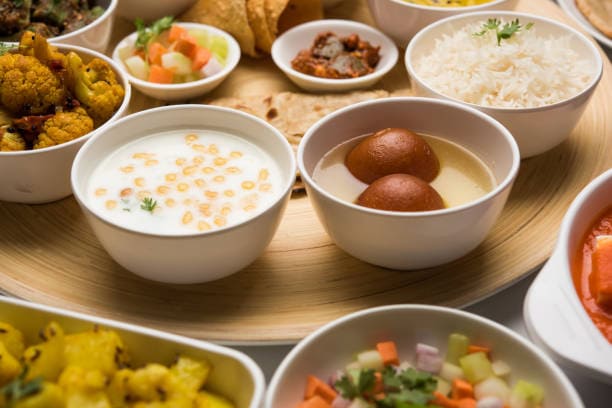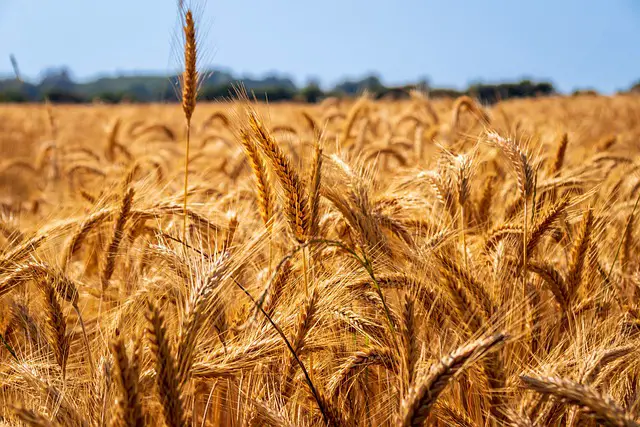Hindus practice a vegetarian diet primarily.
Food choices indicate their evolution as part of the culture and society.
This choice is mainly influenced by the environment around and the availability of resources.
Possible Reasons for Vegetarianism
High water content (Scientific)
- Vegetarian food like vegetables, fruits have high water content like upto 70%.
- Our body also has high water content upto 70%.
- So having Vegetarian diet seems more compatible to the body.
- Hindu practices are mostly scientific and hence this food preference could also be based on it.
Choice of many varieties.
- A vegetarian diet enables one to make a lot of variety dishes.
- One can have different types of food: breakfast, lunch, and evening supper.
- These can include sweet, hot, and even spicy food.
- This way, the diet will not be bland and can even enhance the appetite.
- So a person can eat to heart content without affecting his gut
Suitable land and climate
- The practice of hinduism originated in india which has an abundant arable land with timely monsoons.
- These factors helped in growing mutliple crops every year.
- The produce from crops can be best used as food primarily and for clothing and others secondarily.
- Hence, they might have adopted a vegetarian diet as it is easier to procure in large quantities.
- So, there was no need for them to survive on animal meet.
It promotes greenery and biodiversity.
- When a man grows food, it also helps in feeding other animals starting from microbes, insects, birds, and mammals.
- So, besides him, he also indirectly provides food for them. This way, it supports the whole food chain.
- Large plants like mango and apple grow fruits with seeds.
- The intention could be that the fruit is carried for eating, and the seed is disposed of in a place distant from the mother plant.
- Thus, humans and animals help in plant propagation.
It is harmless and avoids pain to other living beings
- Most food we take is from the dead plants.
- For example, the wheat, pulses, paddy, sorghum, etc., are harvested after they are dried dead on the farm.
- Their life span is around 3 to four months, so they naturally expire.
- So, the plant is dead, and the man takes the produce from it.
- Even the residue can be used as fodder for animals.
It keeps humans pleasant and cool-headed.
- As per the Bhagavad Geeta, the vegetarian diet is considered sattvic. This diet promotes harmony of mind and body.
- This can lead to a pleasant mind and a peaceful society.
- A pleasant mind is essential for spiritual progress.
- Even a large population can be fed adequately with a vegetarian diet.
Scientific and health benefits.
- Scientifically, the gut is longer for humans, similar to herbivores, unlike carnivorous animals, to be vegetarian.
- Besides, their teeth and even stomach acidity are similar to herbivores and not carnivores.
Besides, a non-veg diet promotes the chances of catching infections.
- You might have noticed that infections like COVID and bird flu (Avian flu) tend to infect humans after getting exposed to animals.
- This could be because the physiology of birds and other animals resembles humans, and the pathogens can easily adapt to the human body.
- But, this is not so for plant diseases. Plant physiology is completely different from animals and humans; hence, the chances of spreading infections between them are minimal.
- So, it could be possible that a vegetarian diet is disease-free and healthy for the body.
Medicine value through diet
- A vegetarian diet includes some spices and other substances that promote health.
- For example, garlic is widely used to help remove blood cholesterol and reduce blood pressure.
- Similarly, cardamom, clove, and ginger act as gas expellers.
- Turmeric acts as an antiseptic.
- The high fiber content in the vegetarian diet reduces the chances of constipation.
- Fibrous food absorbs water and increases the bowel load for easy expulsion.
It is environmentally friendly.
- When one eats a vegetarian diet, the chances of environmental pollution and its effect on global temperature are low.
- A turkey needs many pounds of wheat to grow, which can be eaten by man.
- Man can instead eat wheat directly, minimizing the wastage of wheat for diet.
Spiritual opinion
- Eating a non-vegetarian diet is said to lead to bad karma in life, for which one has to pay later.
- This non-veg diet karma is specifically bad for the planet Saturn in a person’s astrology.
- So, vegetarianism also minimizes the chances of bad karma and rebirth.
FAQ’s
Is non vegetarian food prohibited in hinduism
Non-vegetarian food is discourage in hinduism as it is believed to influence the mood of people.
To enhance spiritual mood and also maintain better health of individuals, families and soceities this is practised.
Eating non vegetarian food is considered dirty, unclean and harmful.
References
- What Is a Sattvic Diet?
- Sattvic diet
- Are Humans Carnivores or Herbivores?
- Vegetarian Diets Lower Severity of COVID-19 Infection
- 7 reasons why meat is bad for the environment
- 5 things to know about karma and reincarnation
- New Evidence Supports Animal Origin of COVID Virus through Raccoon Dogs
- Bird flu outbreak raising concerns about the spread.
- Plant-Based Diets on Communicable Diseases


